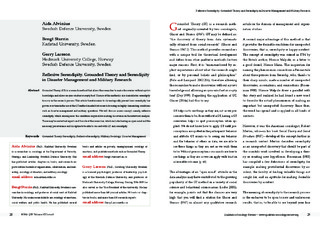| dc.contributor.author | Alvinius, Aida | |
| dc.contributor.author | Starrin, Bengt | |
| dc.contributor.author | Larsson, Ulf Gerry | |
| dc.date.accessioned | 2017-02-13T09:50:05Z | |
| dc.date.available | 2017-02-13T09:50:05Z | |
| dc.date.issued | 2016 | |
| dc.identifier.issn | 1733-8077 | |
| dc.identifier.uri | http://hdl.handle.net/11250/2430401 | |
| dc.description.abstract | Grounded Theory (GT) is a research method that allows the researcher to make discoveries without a priori knowledge, and allows an open mind not an empty head. The use of this method is also desirable for serendipity to occur in the research process. This article therefore aims to chronologically present how serendipity has grown over time in the use of the GT method in a field of research focusing on highly demanding conditions such as disaster management and military operations. We will discuss a new concept, namely, reflexive serendipity, which encompasses the conditions required for making discoveries in the interview analysis. These may be contextual aspects and the role of the researcher, which includes having an open mind and the necessary perseverance and discipline to be able to succeed with GT and serendipity. | nb_NO |
| dc.language.iso | eng | nb_NO |
| dc.rights | Attribution-NonCommercial-NoDerivatives 4.0 Internasjonal | * |
| dc.rights.uri | http://creativecommons.org/licenses/by-nc-nd/4.0/deed.no | * |
| dc.title | Reflexive serendipity: Grounded theory and serendipity in disaster management and military research | nb_NO |
| dc.type | Journal article | nb_NO |
| dc.type | Peer reviewed | nb_NO |
| dc.source.pagenumber | 28-42 | nb_NO |
| dc.source.volume | 12 | nb_NO |
| dc.source.journal | Qualitative Sociology Review | nb_NO |
| dc.source.issue | 3 | nb_NO |

